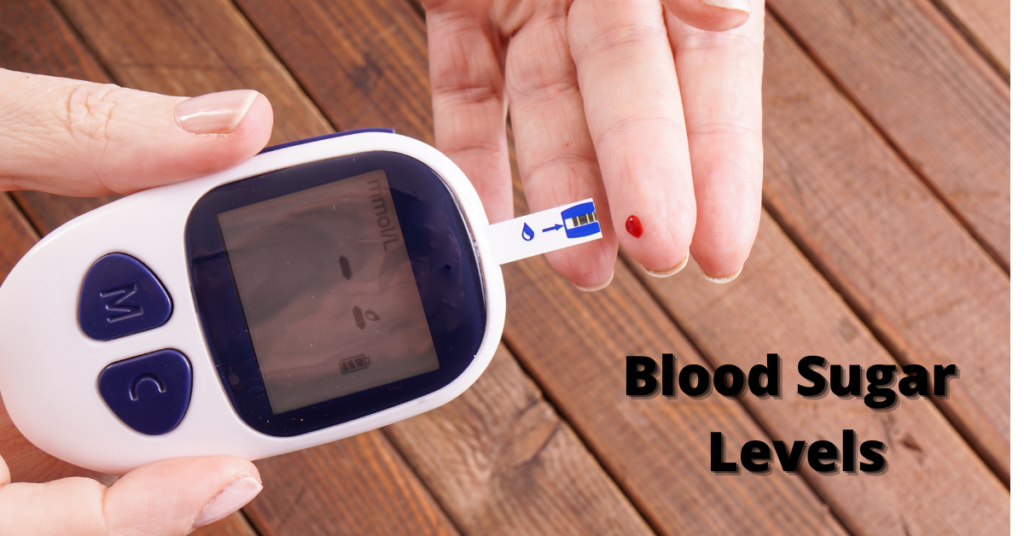Blood Sugar Levels
Sugar levels are the amount of sugar in the blood. Every 72 hours, the body requires 4 grams of glucose to keep running. Blood sugar levels generally rise after eating food. After a few hours, when insulin transports glucose into your cells, blood sugar levels fall.
Blood Sugar

It is the primary sugar that is present in the blood. . Glucose is a type of sugar that comes from the food you eat. It circulates around the body to provide energy to your cells. It originates and stores within your body. Insulin is a hormone that promotes the movement of glucose throughout your body.
How Does Body Make Sugar?
Sugar is made primarily by eating meals that are high in carbohydrates, such as potatoes, bread, fruit, and other foods. The food passes from your mouth to your stomach as you eat it. During this process, bodily acids break it down into smaller pieces. This is the time when it releases sugar. It then enters your bloodstream via your intestine. Once your sugar level has dropped below a certain threshold, the pancreas releases insulin to assist glucose entering into your cells.
Types of Blood Sugar Levels
These are some types of Blood Sugar Levels:
High Blood Sugar Levels
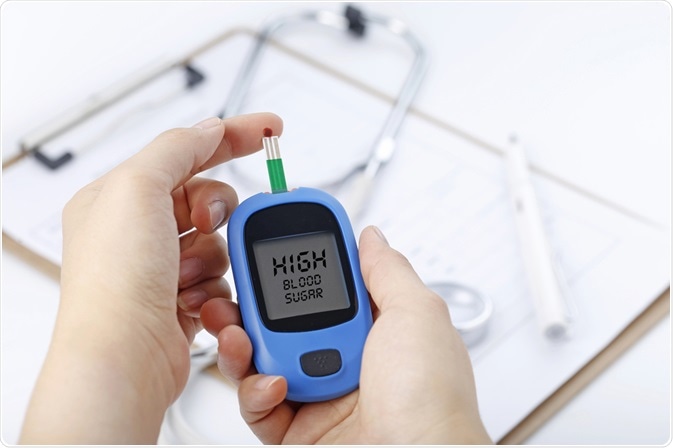
Excess glucose, often known as hyperglycemia, is a disease in which there is an excessive amount of glucose circulating in the blood. Hyperglycemia is a major issue that may have severe consequences for both Type 1 diabetics and Type 2 diabetics. High blood sugar levels are present if they are more than 130 mg/dL before a meal and 180 mg/dL after a one-two hour gap between meals.
Symptoms
These are some symptoms of High Blood Sugar Levels:
Blurred vision: You start to see blurriness around the edges of your sight.
Dehydration: Your body is craving water because it knows that you are dehydrated, but can’t tell you because there’s too much sugar in your system. You may also start to notice a dry or sticky feeling on the roof of your mouth and throat area when this happens.
Fatigue: You feel tiredness in your body. Because of this, you may face difficulty in doing day-to-day activities.
Frequent Urination: Your body is trying desperately to flush out excess sugar through your urine stream. This can lead you to urinate more often than normal or even at night while sleeping.
Hunger Pangs/Cravings for Sweets: Your body is hungry because it needs a steady supply of energy, but you can’t get any from the excess sugar in your system.
Weight Gain: Excess sugar leads to weight gain over time and less muscle mass, which will make losing weight more difficult later on down the road.
Causes
High blood sugar levels are usually caused these reasons:
- You start eating too much sugar. This is the most common cause of high blood sugar levels and can be combated with a proper diet.
- The body may not produce enough insulin to counteract how much glucose (sugar) there is in your system, which leads to diabetes or pre-diabetes. Your doctor will need to test your insulin levels to know for sure if this is happening.
- You may be dehydrated because of the amount of sugar you have consumed over time and not drinking enough water daily.
Treatment
A Doctor should be consulted if a person with diabetes has any early manifestations of high blood sugar levels. There are several home treatments that can help you to treat this:
- Drink more water: Water helps to remove sugar from the blood through urination, preventing dehydration.
- Do Exercise: Although working out frequently helps to reduce your blood glucose level, in some circumstances it can actually raise it. You should consult a doctor for the proper exercise routine that will be beneficial for you.
- Monitor Ketones: If a person has Type 1 diabetes and their blood sugar levels are out of control, it’s important to monitor their urine for ketones. When you have them, you must cease working out. If the blood sugar is high while you have no ketones in your urine and you are well-hydrated. Your doctor may then prescribe the activities that you recommend.
- Alter eating habits: Patients should see a dietitian modify the quantity and types of food they consume to achieve a nutritional balance in their diet.
- Change Medications: If you have diabetes, your doctor may change the quantity, timing, and type of medicines you take. Do not adjust your treatment unless advised to do so by a specialist.
Prevention
There are methods to keep your blood sugar levels in check. If one follows the correct procedures, he or she should not be concerned about high blood levels.
- Know your diet and keep track of how many carbohydrates you take in throughout the day and night.
- Check your blood glucose levels on a regular basis.
- Keep an eye out for recurrent severe blood glucose levels.
- Wear medical identification in the event of an emergency so that others know you have diabetes.
Low Blood Sugar Levels
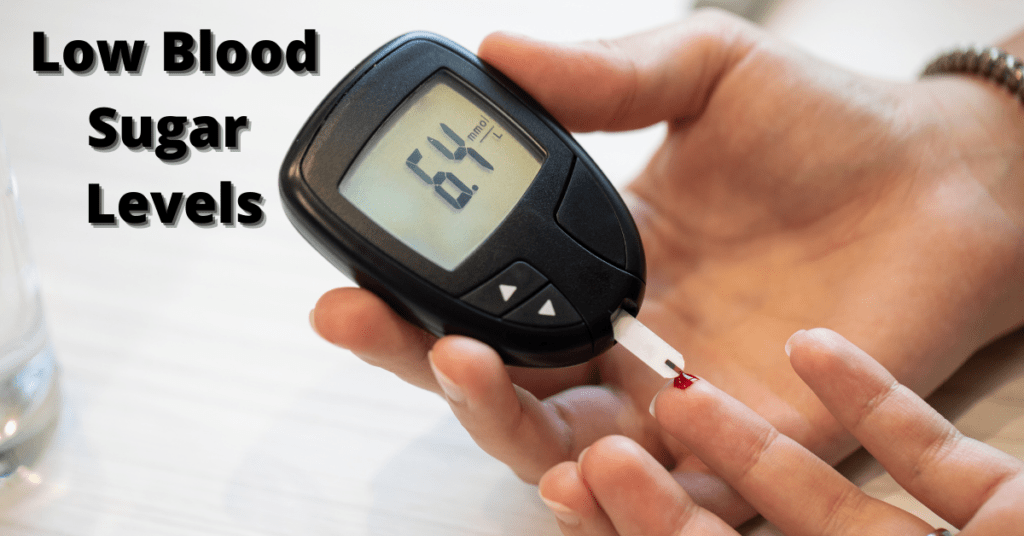
Hypoglycemia is a condition in which your blood glucose level is lower than normal. This scenario can happen when a person has diabetes and is using insulin or other diabetic drugs to manage the disease. This can be dangerous for someone with diabetes. Low blood sugar levels are also known as hypoglycemia.
Symptoms
These are some symptoms of low blood sugar:
Headache: Sometimes a headache can accompany low blood glucose levels and may be accompanied by nausea or vomiting.
Irritability: When this happens, you might become very grumpy and impatient over even small things that wouldn’t normally bother you.
Muscle Weakness: You start to feel very tired and lethargic, especially in the arms or legs. This is an extreme sign of low blood sugar levels if it happens so suddenly that you can’t help but sit down where ever you are at the time because your muscles don’t want to work anymore.
Rapid Heartbeat: This can go hand in hand with nausea, headache, or feeling faint.
Sweating/Chills: You may feel hot and cold at the same time because your body is trying to regulate itself by either sweating (heat) or shivering (cold).
Causes
A low blood sugar level usually comes on for one reason:
- Not eating enough food throughout the day. If you are hungry all of a sudden after not eating anything for several hours, this could be an indication that you need more food than what you’re currently taking in. Try adding small snacks during the early afternoon if it happens often so that your blood sugars stay stable throughout the entire day rather than dipping too low.
- You may be severely dehydrated because of not drinking enough water or taking in too much caffeine, alcohol, and/or sugar without hydrating yourself first. If you feel thirsty all the time after this happens, try to drink more water throughout the day so that your body doesn’t get dangerously close to a state where it can no longer regulate itself properly.
- You may have a hormone imbalance, which leads to the blood sugar levels dropping. This can happen with diabetes or pre-diabetes and needs medical attention from your doctor.
Treatment
If a person’s glucose levels are consistently low, he or she should see a doctor right away. If you’re already a patient, you should talk to your doctor about how you’re administering your insulin and whether anything has changed in terms of type or amount. However, there are certain at-home treatments that can help to treat low blood sugar levels:
- Eat, drink, or take something sweet so that it may be absorbed into your system right away. Regular soda, orange juice, cake frosting, and glucose tablets or gels are all examples of foods or drinks with a significant amount of sugar.
- Allow 10 minutes for the sugar to do its job.
- If the signs are persistent and worsen if you eat, drink, or take glucose tablets, you should receive a glucagon injection. Glucagon is a hormone that aids in the rapid rise of blood sugar levels.
Prevention
It’s better to prevent illness than to cure it. It is always preferable to prevent low blood sugar rather than treat it. One should always have a source of fast-acting sugar on hand. Other methods for avoiding this include:
- Check your sugar levels after you exercise and have some snacks on hand.
- If you’re an athlete and need to take insulin, talk to your doctor about how much to take on the days you exercise.
- If you need any bedtime snacks to avoid low blood sugar levels during the night, speak with your doctor.
- When you drink alcohol without eating, it’s very easy to get dehydrated. Women should limit themselves to one drink, while men should avoid more than two each day.
- For pregnant women, maintaining good blood sugar control is critical. You should do regular exercises, but with the permission of the doctor.
Normal Blood Sugar Levels
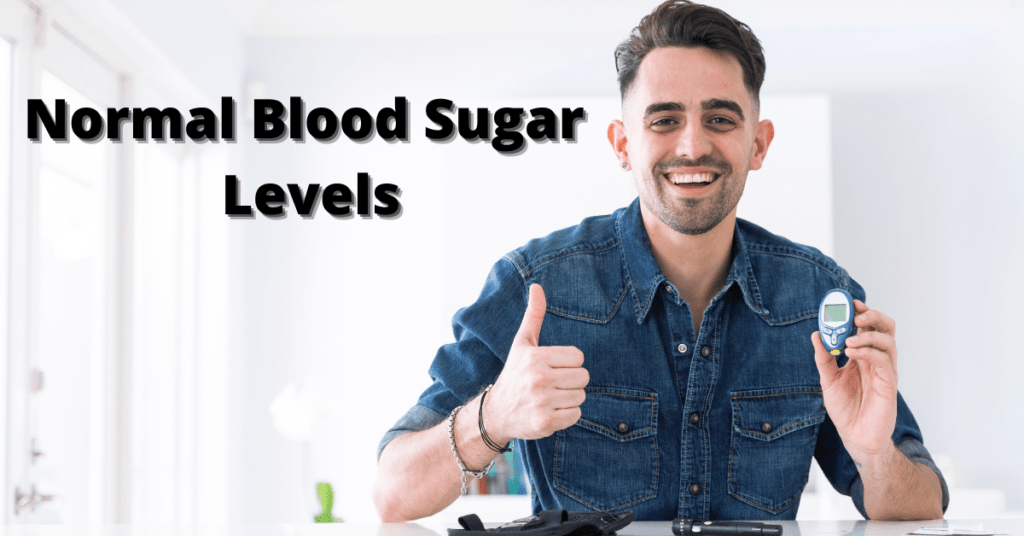
When someone eats, their blood sugar levels can typically be determined, and after they’ve eaten. Many factors influence your blood sugar levels throughout the day. These include how much food you have consumed, your physical activity level, medical problems, menstruation cycles, alcohol consumption, dehydration, and so on.
Without Diabetes
Any age should have less than 100mg/dL of blood glucose in the morning, and it is dependent on the conditions mentioned above at the end of the day.
With Diabetes
For people with diabetes, blood sugar levels vary according to age and the time of day.
Blood Sugar Levels In Children

Sugar levels in children under the age of six should be between 80 and 200 mg/dL. This is a healthy range and the quantity of glucose in a child’s body varies throughout the day, from when they wake up through eating food and before bedtime. The average blood sugar level in most individuals varies between 100 and 180 milligrams per deciliter (mg/dl). For example, before a meal, the typical blood sugar levels are between 100 and 180 mg/dL, whereas it is approximately 180 mg/dL after eating for a few hours. In the middle of the night, parents may have to test children with diabetes or in a hypoglycemia situation.
Blood Sugar Levels In Adolescents
The following are the recommended blood sugar ranges for youngsters 6 to 12 years old: During the day, children aged 6 to 12 must keep their sugar levels between 80 and 180 mg/dL. For example, a child’s blood sugar level might range from 80 to 180 mg/dL in the early morning, reaching 90 to 180 mg/ dL. When you consume carbohydrates, the body breaks them down into glucose. These then get circulated in your body. It is like after a few hours it can reach 140 mg/dL, and at night (bedtime), it ranges from 100-180 mg/dL.
Blood Sugar Levels In Teens
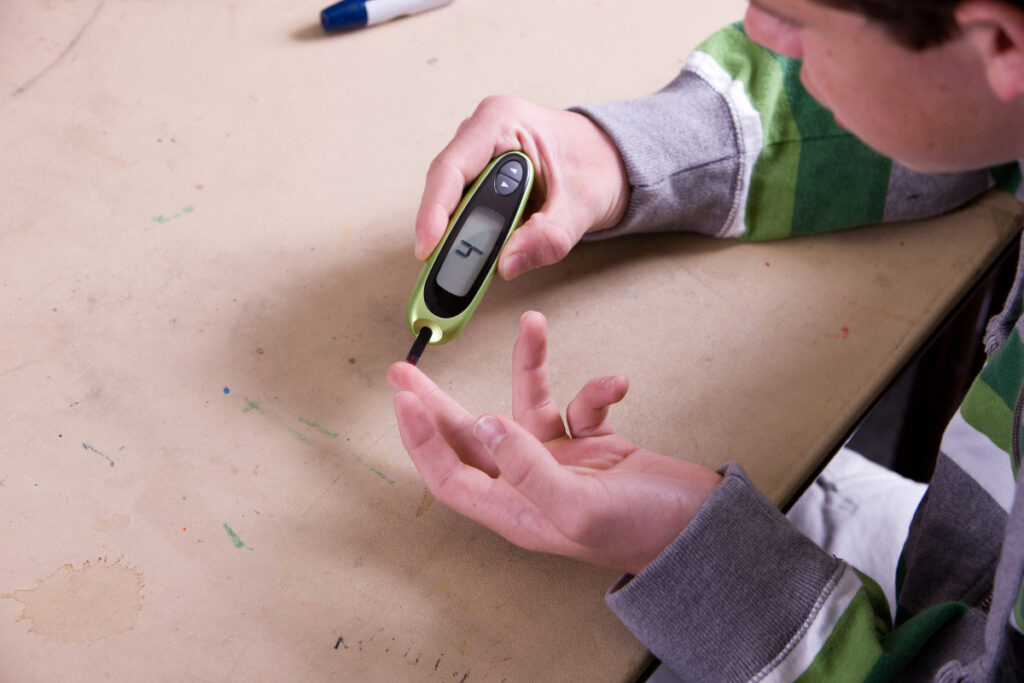
Every waking hour, the average blood sugar level for teenagers should be between 70 and 150 mg/dl. For example, it might range from 70 to 150 mg/dL in the morning, then settle at 90-130 mg/dL during the day. It may rise as high as 140 mg/dL after a few hours of eating. During sleep, it may be anywhere from 90 to 150 mg/dL. Adolescents with diabetes have more difficulties than adults because the management of diabetes necessitates a great deal of responsibility and good conduct, which can be challenging for most adolescents. Keep an eye on their sugar levels throughout the day to ensure that they don’t go too low or high. They should pay attention to what they’re eating and how much exercise they’re getting.
Blood Sugar Levels In Adults
During the day, sugar levels in adults (20 years or more) range from 70 to 180 mg/dL. When you get up in the morning, your blood sugar level should be at its lowest since you haven’t eaten for more than eight hours. For example, by breakfast time, your sugar levels should be less than 100 mg/dL. After eating, the level varies from 70 to 130 mg/dL. It is less than 180 mg/dL after a few hours of eating. It usually ranges from 100 to 140 mg on waking (bedtime). A Doctor will assist you in developing a strategy to keep track of your blood sugar levels accurately if you are having problems with your glucose management.
Conclusion
The key to maintaining a healthy blood sugar level is moderation. If you’re going to eat something high-carb, make sure it’s balanced with protein and fiber so that the spike in your blood sugar will be less dramatic. You should also avoid snacking on unhealthy foods between meals as this can lead to spikes in your blood sugar levels as well. In order for your body to maintain a stable equilibrium of glucose, it’s important that you keep up with the guidelines that are mentioned in the above article.
The brain can’t function properly without enough glucose. When sugar levels drop, the body will break down fat stores to make up for this lack of energy. This process is called gluconeogenesis and it generates ketones that are released into your urine as a by-product. Ketosis happens when you’re on an extremely low carbohydrate diet or fasting. People with diabetes have difficulty regulating their blood glucose levels because they don’t produce enough insulin which leads to elevated ketones in their urine. If these symptoms sound familiar, visit your doctor! There are many different treatments available depending on what type of diabetes you have so found out more about yours today.
Do you want to get rid of diabetes? Join our online diabetes consultation program and reverse your Diabetes naturally through lifestyle changes such as a Personalized Diet plan, Exercise, dieticians, and health coaches.
